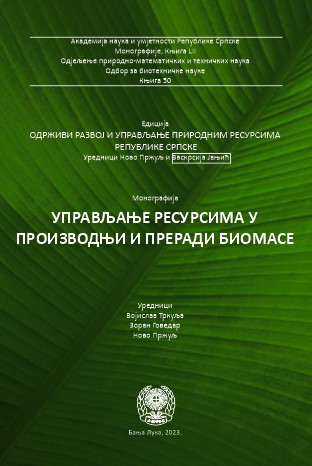Economics of investment projects in the field of biomass power plants
DOI:
https://doi.org/10.7251/EORU2306703KKeywords:
: Renewable energy sources, potentials, regulations, incentives, research and development, profitabilityAbstract
Renewable energy sources (wind energy, solar energy, hydropower, ocean energy, geothermal energy, biomass and biofuels) are a kind of substitute for fossil fuels and contribute to reducing greenhouse gas emissions, diversifying energy supply opportunities, as well as reducing dependence on increasingly unreliable and unreliable fossil fuel markets, especially oil and gas. The economic competitiveness is already shown by several technologies, especially wind energy, small hydropower plants, biomass energy and solar energy. All modern countries have a defined policy of using biofuels and producing energy from biomass. Support through official incentives for electricity generation is provided in almost all countries. The legal framework for the production of biofuels and energy from biofuels is defined at the level of Republika Srpska, with international framework regulations and agreements, primarily with the European Union as one of the most important international entities, signed at the level of Bosnia and Herzegovina. The status of the Brcko District is special, where in accordance with the decision on arbitration Republika Srpska, together with the Federation of Bosnia and Herzegovina, is obliged to ensure the energy supply of the Brcko District with electricity. Accordingly, electricity from renewable sources in Srpska falls into the same category. The legal provisions of Bosnia and Herzegovina, Republika Srpska and the Federation of Bosnia and Herzegovina or special provisions of the Brčko District may be applied within the District. The transition from traditional to renewable energy sources, although necessary, is burdened by the question of cost-effectiveness and sustainability of such systems. Compared to traditional (fossil) sources, energy production based on renewable sources is more difficult and slower to achieve economic competitiveness, given that (especially in the initial phase) this type of investment requires significant capital, which further results in high prices of the energy produced. The role of catalysts for cost efficiency and energy transition in the direction of increasing the share of renewable energy sources in total production is played by the incentive system. However, this system needs to be justified in terms of the continuous monitoring of the results of that support. In other words, encouraging technologies that do not produce results in the long run, visible in the reduction of costs or productioncosts, has no rational justification, regardless of the type of energy source on which they are based. Investment as an economic category is one of the most important topics of economic theory, especially when it comes to applied economic analysis, policy and planning. These topics contain the totality of the future-oriented economy, which is why they are of great importance for the economic development and prosperity of any economic system. Investments are, therefore, determinant of economic development as a whole (macro point of view), but also of enterprise development (micro level), at the same time a risky and attractive category. Investing means cash investment of capital in real or financial assets, with the aim that future value is higher than current investments and that a certain income is achieved. It is necessary to take into account the time dimension of money, in order to make the right investment decisions. Establishing the relationship between the four basic components: investment, cash flow of the project, economic life of the project and net cash flow from the liquidation of the project (residual value) is an assessment of whether the investment is acceptable or not. Countries in transition meet a number of assumptions that, in the opinion of most respectable authors, are key to a more positive public sector attitude toward private participation in capital social projects. National economies solve problems that are an obstacle to stable growth and development in various ways, based primarily on investment activities as drivers of economic recovery. During that process, the private sector can be recognized as a potential partner, but the manner and intensity of this cooperation depends on several interrelated factors, primarily in the public sector. Republika Srpska has a positive and active approach to public investment, which has been particularly pronounced in recent years. In an effort to better manage the processes related to public investments, the public authority has defined the so-called functional system of programming development and policy coordination in the Republic of Srpska, which implies harmonization of individual sectoral strategies with the general goal – efficient management of public finances. Strategic priorities are defined in the framework budget document, annual budgets and the Republika Srpska Public Investment Program, which is adopted twice a year for the period of the next three years. The Public Investment Program in the Republika Srpska is a complex document, which contains planned investments by type, amount, carrier, source of financing and other relevant information, including projects that are being implemented. Over the last decade, this document has often been substantially and formally redefined, and the methodology of its development has been harmonized with the needs and gained practical experiences. Investments of a predominantly social nature are most often realized without a partnership with private entities, or their participation is limited. However,productive investments, especially those that may have partial or complete commercial use, are becoming more and more interesting to the private sector, given the basic goal of every business entity: return on investment, i.e., the profitability of an economic enterprise.
